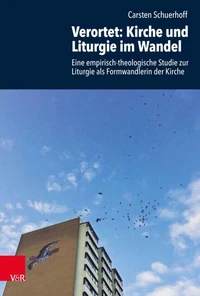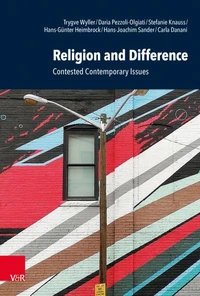The Spaces of Others – Heterotopic Spaces. Practicing and Theorizing Hospitality and Counter - Conduct beyond the Religion/Secular Border
Par : , , ,Formats :
Disponible dans votre compte client Decitre ou Furet du Nord dès validation de votre commande. Le format PDF est :
- Compatible avec une lecture sur My Vivlio (smartphone, tablette, ordinateur)
- Compatible avec une lecture sur liseuses Vivlio
- Pour les liseuses autres que Vivlio, vous devez utiliser le logiciel Adobe Digital Edition. Non compatible avec la lecture sur les liseuses Kindle, Remarkable et Sony
 , qui est-ce ?
, qui est-ce ?Notre partenaire de plateforme de lecture numérique où vous retrouverez l'ensemble de vos ebooks gratuitement
Pour en savoir plus sur nos ebooks, consultez notre aide en ligne ici
- Nombre de pages197
- FormatPDF
- ISBN978-3-647-60455-8
- EAN9783647604558
- Date de parution12/09/2016
- Protection num.pas de protection
- Taille9 Mo
- Infos supplémentairespdf
- ÉditeurVandenhoeck & Ruprecht
Résumé
In the present situation in the world, values of tolerance, compassion and hospitality appear to be more contested. The debates among European leaders have come to center around how to "protect us" from refugees, rather than protecting the precarious lives of the refugees. The authors agree that we should not stop looking for practices of hospitality. We need to better understand what hospitality is, where it is practiced and also why it is practiced.
Hospitality is not necessarily something we possess as an inner quality or as something disconnected from others. Rather it is practiced in specific ways in in particular spaces. The thesis is that we have to look for the characteristics of hospitality in "the other spaces" that Michel Foucault once called heterotopias. Five specific cases are analyzed: - a monastic garden for interreligious dialogue in Austria, a Lutheran congregation that accommodates a project for undocumented migrants in Western Sweden, a busy intersection in downtown Oslo where substance-users stay (and most others pass by), a voluntary organization that works for the creation of alternative life forms in inner city Copenhagen, and, finally, some aspects of the Occupy Wall Street movement in New York City.
The authors are theologians, sociologists and a PhD candidate in diaconia, an illustration of the interdisciplinary composition of the book.
Hospitality is not necessarily something we possess as an inner quality or as something disconnected from others. Rather it is practiced in specific ways in in particular spaces. The thesis is that we have to look for the characteristics of hospitality in "the other spaces" that Michel Foucault once called heterotopias. Five specific cases are analyzed: - a monastic garden for interreligious dialogue in Austria, a Lutheran congregation that accommodates a project for undocumented migrants in Western Sweden, a busy intersection in downtown Oslo where substance-users stay (and most others pass by), a voluntary organization that works for the creation of alternative life forms in inner city Copenhagen, and, finally, some aspects of the Occupy Wall Street movement in New York City.
The authors are theologians, sociologists and a PhD candidate in diaconia, an illustration of the interdisciplinary composition of the book.
In the present situation in the world, values of tolerance, compassion and hospitality appear to be more contested. The debates among European leaders have come to center around how to "protect us" from refugees, rather than protecting the precarious lives of the refugees. The authors agree that we should not stop looking for practices of hospitality. We need to better understand what hospitality is, where it is practiced and also why it is practiced.
Hospitality is not necessarily something we possess as an inner quality or as something disconnected from others. Rather it is practiced in specific ways in in particular spaces. The thesis is that we have to look for the characteristics of hospitality in "the other spaces" that Michel Foucault once called heterotopias. Five specific cases are analyzed: - a monastic garden for interreligious dialogue in Austria, a Lutheran congregation that accommodates a project for undocumented migrants in Western Sweden, a busy intersection in downtown Oslo where substance-users stay (and most others pass by), a voluntary organization that works for the creation of alternative life forms in inner city Copenhagen, and, finally, some aspects of the Occupy Wall Street movement in New York City.
The authors are theologians, sociologists and a PhD candidate in diaconia, an illustration of the interdisciplinary composition of the book.
Hospitality is not necessarily something we possess as an inner quality or as something disconnected from others. Rather it is practiced in specific ways in in particular spaces. The thesis is that we have to look for the characteristics of hospitality in "the other spaces" that Michel Foucault once called heterotopias. Five specific cases are analyzed: - a monastic garden for interreligious dialogue in Austria, a Lutheran congregation that accommodates a project for undocumented migrants in Western Sweden, a busy intersection in downtown Oslo where substance-users stay (and most others pass by), a voluntary organization that works for the creation of alternative life forms in inner city Copenhagen, and, finally, some aspects of the Occupy Wall Street movement in New York City.
The authors are theologians, sociologists and a PhD candidate in diaconia, an illustration of the interdisciplinary composition of the book.








